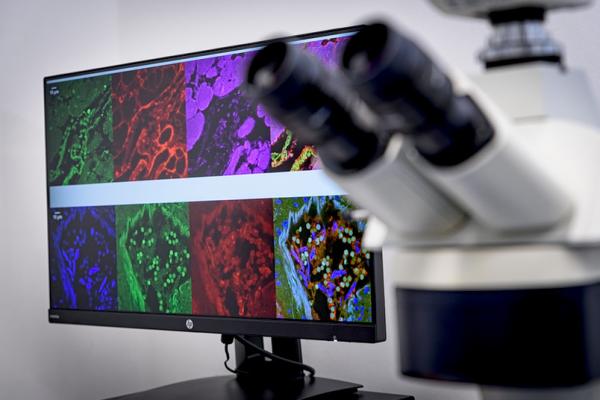
A medical researcher at RUB has discovered how the coronavirus enters the heart muscle cells. © Roberto Schirdewahn
July 5, 2022 — The International Journal of Cardiology published an article on the findings of how the Coronavirus attacks the heart, which occurs mainly in patients with comorbidities such as obesity, diabetes and hypertension.
Virus Detected in Heart Cells
In order to track down the new entry mechanism, the research team at the university hospital used histochemical methods and microscopy to analyze heart tissue structures from patients suffering from COVID-19 and those who died from or with the disease. In a first step, they provided evidence that the virus can indeed be detected directly in the cells of the heart muscle. “Our observations show that the virus exerts pressure on the heart muscle, attacks and weakens the contractile force, i.e. the pumping function of the heart,” said Nazha Hamdani, head of the research department for molecular and experimental cardiology at the Bochum University Hospital.
But how does the virus enter the heart? What mechanisms facilitate the penetration of the virus into the heart muscle cells? The Bochum team showed that one possible mechanism of cardiac muscle cell dysfunction in Sars-Cov-2 patients is the activation of certain enzymes that degrade proteins. In fact, the team detected an increased so-called proteolytic activity.
This suggests that Sars-Cov-2 enters cells as a result of the activation of the spike protein by enzymes responsible for the degradation of proteins, and that its entry into cells depends on these degradation enzymes. In addition, Hamdani’s group investigated proteins that are responsible for apoptosis, i.e. cellular suicide. The team showed that while the apoptotic proteins had increased activity, their expression was drastically reduced. “This indicates that the proteins are cleaved and apoptosis is activated,” explained Hamdani. “The results imply that apoptosis contributes to the deterioration in cardiac contractility observed in Sars-Cov-2 patients.”
The Key Role of Inflammation and Oxidative Stress
In the next step, the team set out to explore what promotes the increased proteolytic activity and apoptosis of cardiac myocytes. The study showed that oxidative stress and a pro-inflammatory environment exacerbate the damage associated with Sars-Cov-2. The focus here was on the so-called neutrophils. Neutrophils are one of the primary cell types that release proteolytic enzymes. They play an essential role during an inflammatory response. They are rapidly mobilized from the bloodstream into the damaged tissue. Since proteolytic enzymes are released more frequently in Sars-Cov-2 patients, Hamdani’s team analyzed the signaling pathway, more specifically the interleukin-6-driven neutrophil traffic. The researchers found that inflammatory signaling pathways in cardiac myocytes were highly regulated – i.e. interleukin-6 was highly elevated – suggesting a key role for these white blood cells in COVID-19 and associated inflammatory pathologies.
Alternative Gateways
Furthermore, the Bochum-based researchers have backed the existing findings that the virus also uses the protein neuropilin-1 (NRP-1) as a gateway into the cells. Hamdani’s research shows that the coronavirus thus has several mechanisms at its disposal to spread in human organs. “Sars-Cov-2 is able to spread in the infected heart in a receptor-dependent and receptor-independent manner. We also examined another mechanism by which the virus can gain access to the heart muscle cells, thus contributing to endothelial dysfunction. We will soon be able to publish these results,” concluded Hamdani.
For more information: https://www.ruhr-uni-bochum.de/en
Related Long-COVID Content:
MRI Sheds Light on COVID Vaccine-Associated Heart Muscle Injury
What We Know About Cardiac Long-COVID Two Years Into the Pandemic
VIDEO: Long-term Cardiac Impacts of COVID-19 Two Years Into The Pandemic — Interview with Aaron Baggish, M.D.
VIDEO: Long-COVID Presentations in Cardiology at Beaumont Hospital — Interview with Justin Trivax, M.D.
VIDEO: Cardiac Presentations in COVID Long-haulers at Cedars-Sinai Hospital — Interview with Siddharth Singh, M.D.
Find more COVID news and videos
Related COVID Content:
COVID-19 Fallout May Lead to More Cancer Deaths
Kawasaki-like Inflammatory Disease Affects Children With COVID-19
FDA Adds Myocarditis Warning to COVID mRNA Vaccine Clinician Fact Sheets
CMS Now Requires COVID-19 Vaccinations for Healthcare Workers by January 4
Cardiac MRI of Myocarditis After COVID-19 Vaccination in Adolescents
Small Number of Patients Have Myocarditis-like Illness After COVID-19 Vaccination
Overview of Myocarditis Cases Caused by the COVID-19 Vaccine
Case Study Describes One of the First U.S. Cases of MIS-C
NIH-funded Project Wants to Identify Children at Risk for MIS-C From COVID-19


 January 05, 2026
January 05, 2026 









